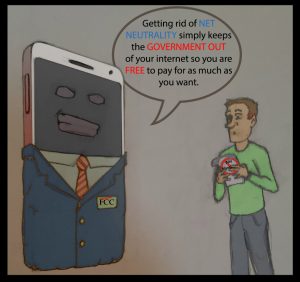The end of net neutrality will hit you harder than just in your wallet
What if we lived in a world where an Internet service provider (ISP) could slow down or increase your internet speed based on how much you pay or which websites you visit? What if everything you wanted to browse came with a price? Would you stay silent or would you stand up and do something about it?
Well this is not a distant reality; the Federal Communications Commission (FCC) will vote for the destruction of current net neutrality regulations Dec. 14. The benefactors of the end of net neutrality is not every day Americans; it is big businesses that have only one thing in mind and that is to increase their profits.
Net neutrality is a basic principle that has made the internet into what it is today. It prevents big ISPs like Verizon, Comcast and AT&T from charging extra fees and censoring what they want or controlling what we see and do online. The creators of the internet intended for it to be an unbiased ecosystem that creates an equal platform to voice opinions and launch innovations.

So, what is the big deal? So what if big businesses control everything on Internet? The positive of getting rid of net neutrality regulations, many conservatives said the promotion of innovation and allowing those who cannot access the internet with the ability to do so.
Comcast, Verizon and AT&T are all on board with FCC Chairman Ajit Pai’s proposal to repeal current net neutrality regulations. Pai was a former lawyer with Verizon, so it is worth questioning what the true intentions of this repeal are. Verizon would make a great deal of money from consumers once fees are deregulated. Pai said that America will thrive without net neutrality by removing anti-competitive regulations. Is his concern the American citizen or increasing his wallet size by helping his friends at Verizon?
One real-life scenario out there for everyday consumers to consider is the notion of cutting ties with cable and satellite providers and switching to online services such as Netflix or Hulu. As of right now, many consumers are doing just that and are saving hundreds of dollars annually, but with the end of net neutrality an ISP could slow the Internet down to a point where those services would be severely hindered, bringing you right back into their superior service or charging you extra for decent access to their competitors.

Former Chairman of the FCC Tom Wheeler has strong feelings about what the impact of ending net neutrality would have on the overall mission of the FCC and who the sole benefactors truly are. He called this move “tragic” and said that the FCC should be there for the consumer, not against them.
Fight for the Future, a non-profit organization, has built a website asking people to stand up and fight to keep the internet a neutral playing field. This website provides access to protests in your area, a contact form to write a letter to Congress and even a phone number to call Congress.
The American public needs to speak out and fight for what they believe is right. There is still time and everyone’s voice needs to be heard. What can you do to help the fight? Contact Congress and join in on protests that are happening all across the United States.
Ending net neutrality will hurt Americans a lot harder than just in their pocket books, it could potentially silence everyday Americans from ever being heard. It could cripple businesses that are small and trying to compete. It could destroy the American dream that many have fought for and died for. Now is the time to be as loud as possible and make sure the government hears you.

